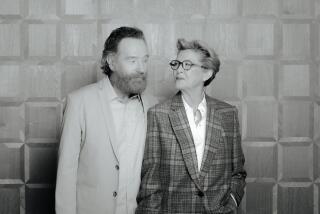Ramis puts faith into irreverence
In the beginning, there were circumcision jokes, slapstick and . . . a plea to turn away from pious intolerance?
Directed by Harold Ramis, “Year One” is a prehistoric comedy with an irreverent take on religious fundamentalism.
“Post-9/11, religious differences were tearing the world apart. Every religion preaches tolerance, yet people were destroying [one another] wholesale,” said Ramis, who co-wrote the script. But how to go about making his point about religious extremism without alienating audiences? “I started thinking, ‘You can’t attack Christianity, Islam or Judaism. But nobody cares if you go after a dead pagan religion.’ ”
In the film, which opens June 19, Jack Black and Michael Cera play exiled tribesmen (with very contemporary sensibilities) who wander through some of the Old Testament’s greatest hits and encounter the likes of Hank Azaria, Paul Rudd and David Cross as Abraham, Cain and Abel, respectively.
“It seemed like a way to talk about fundamentalism, about people’s belief that it’s God behind some of their worst actions,” Ramis said in an editing room on the Sony lot. “So expressing it in the lives of these two characters seemed to make sense -- two complete innocents who know nothing about the world -- and evolve the two prevailing points of view: that life is purposeful and that life is meaningless.”
The ur-slackers’ anachronistic behavior is not a new gag -- it’s at least as dated as a certain 2,000 Year Old Man (think Mel Brooks muddling through the angst of underachieving as a hunter-gatherer) -- but Ramis’ serious aims set this effort apart.
He waxes wonkish about the ancient world and the historical footprints of Old Testament figures: “People picture the Hebrew slaves working on the pyramids; the pyramids were already so old no one even knew when they were built.” Ramis points to his 1993 Bill Murray hit “Groundhog Day” as “the impetus to make comedies that meant something.”
And then there is Cera’s menschy pout framed by a girly wig. “People laugh the minute they see him,” said the director. “It’s just funny putting funny people in ridiculous costumes.”
For locals who already regarded Hollywood as a modern-day Sodom, Ramis may have inspired visions of end times by building, about an hour outside of Shreveport, La., a 6 1/2 -acre reproduction of the infamous biblical city.
“From the beginning, I was afraid that guys would show up in white sheets, you know, and torch the set. I think USA Today said, ‘Has anyone questioned the wisdom of shooting a total sacrilege in the heart of the Bible Belt?’ Ehhh . . . it certainly dawned on me. But they embraced it,” Ramis said.
“At one point we were shooting Sodom and the guy who owned the property brought over several elderly people: ‘This is the minister’s wife,’ because there’s a church every two blocks down there. So I said, ‘Welcome to Sodom. What do you think?’ She said, ‘I think it’s magnificent.’ ”
Aware his irreverent take might irk some who take the Old Testament at its word -- particularly certain of its promises -- Ramis said with some trepidation the Anti-Defamation League would be having a peek soon.
“I’m Jewish; that gives me a lot of room to play. Liberal Jews tend to enjoy self-mockery. All it’s saying is that this notion of being chosen or being given land by God is a hard one for people to swallow,” he said. “So the circumcision jokes, I know they’ll be able to take. I think the land joke is the one that might be more offensive.”
Ramis is careful to point out the movie is “not an attack on religion; it’s an attack on mindless fundamentalism.” He relates an exchange as it was scripted in an early draft: “ ‘You burn virgins so it rains?’ ‘Duh. Where do you think rain comes from? Clouds?’ ”
--
More to Read
Only good movies
Get the Indie Focus newsletter, Mark Olsen's weekly guide to the world of cinema.
You may occasionally receive promotional content from the Los Angeles Times.






